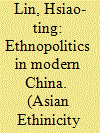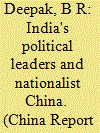|
|
|
Sort Order |
|
|
|
Items / Page
|
|
|
|
|
|
|
| Srl | Item |
| 1 |
ID:
097809


|
|
|
|
|
| Publication |
2010.
|
| Summary/Abstract |
This article reveals the murky political landscape of Alashaa Banner in Inner Mongolia during the Sino-Japanese war (1937-1945). By using various archival documents and secondary source materials, this research seeks to present a clearer picture of Inner Mongolian borderlands, involving the Chinese Nationalists, the Sinicized Muslims, and the Inner Mongols. Instead of restating the 'ineffectiveness' or 'weakness' of the Nationalist frontier administration in China's innermost borderlands during the pre-1949 decades, this article attempts to explore the extent of the war-threatened Nationalist Chinese effort to initiate their state-building tasks and promote their regime's power consolidation in modern China's northern periphery.
|
|
|
|
|
|
|
|
|
|
|
|
|
|
|
|
| 2 |
ID:
133738


|
|
|
|
|
| Publication |
2014.
|
| Summary/Abstract |
This article discusses how, owing to the commonalities in thoughts and actions of Indian and Chinese nationalists, they forged close ties not only at the individual, but also at the organizational, levels. It posits that while the early Indian nationalists sought to pursue the path of armed struggle to dislodge the British from India, in the second phase leaders of the Indian National Congress (INC) sought to establish links with the Kuomintang (KMT), the ruling party in China. The Indian leadership, especially Nehru, was of the view that there was much in common in the struggle carried out in different colonial countries, including the unification drive in China in the 1920s, and that therefore there was a need to forge close ties to support each other's struggles. It was this thinking of Nehru and others national leaders including Gandhi that culminated in Nehru's China visit in 1939 and Chiang Kai-shek's India visit in 1942, although Chiang's prime objective was to muster India's support for the Allied war effort. The quest for alliance with China did not die out even after the Chinese Revolution; however, developments that unfolded thereafter led in a different direction.
|
|
|
|
|
|
|
|
|
|
|
|
|
|
|
|
| 3 |
ID:
141090


|
|
|
|
|
| Summary/Abstract |
This paper aims to provide a new perspective on the relationship between Nationalist Party (GMD) cadres and Chinese intellectuals. By studying the Central Politics School, a major GMD political training institute for professional party cadres, I hope to reassess the nature of the GMD one-party state and remind researchers of the difficult choices it faced between backing party-liners needed for the political struggle and accommodating depoliticized intellectuals needed for public administration. This paper will argue that GMD political impotence in competition with the Chinese Communist Party (CCP) was due less to an inadequate recruitment of capable experts than to the over-specialization of its well-trained cadres on technical tasks. In fact, the cadres from the Central Politics School generally resembled those considered to be ‘intellectuals’ at educational level and in ideology. This compels us to reconsider how to define ‘intellectuals’ and whether they were as uniformly alienated from the one-party state as most of the scholarly literature suggests.
|
|
|
|
|
|
|
|
|
|
|
|
|
|
|
|
| 4 |
ID:
095240


|
|
|
|
|
| Publication |
2010, 2010.
|
| Summary/Abstract |
In the winter of 1945, the multinational Chinese Maritime Customs Service opened an inquiry into the cooperation of hundreds of its own employees with Japanese occupation forces in China. This was, as far as the historical record allows us to say, the most thorough investigation undertaken in China into collaboration during World War Two. This paper represents the first historical analysis of the Customs 'Staff Investigation Committee.' It argues that the investigation represented a new direction for the Customs Service in China. The investigation's underpinning rationale was that Customs staff, Chinese and foreign, served the Kuomintang government before any other notion of Chinese or Service interests-a dramatic change in direction for an organisation that had been emblematic of treaty-port China. The investigation thus offers historians an insight into the understudied final years of the Customs Service, into the late Republican government's efforts to deal with the legacy of imperialism, and into the extent and rationale of collaboration in Nationalist China.
|
|
|
|
|
|
|
|
|
|
|
|
|
|
|
|
|
|
|
|
|